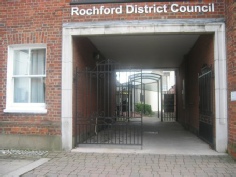








Introduction
One of our declared objectives from the outset when we set up Rochford Life was to bring to the fore aspects of local life that might otherwise escape general gaze. One of our targets was the District Council for which, over the years, we have had the highest regard, for both councillors (elected) and officers (employees). As we have recently had a local Council election it seems an appropriate time to note what had taken place in the recent elections, and then actually what the Council does. Historically we have done this via interviews with both councillors and officers of the Council, and there are many of these interviews available here on Rochford Life. However, here is a fairly light, basic guide that we hope you will find useful.
Part 1: The Recent Elections
Voting for District Councillors
For those who are not sure of these things you will probably be aware that we have just had council elections last Thursday.
Normally councillors come up for election every four years, but because the boundaries have recently been redrawn, all 39 councillors were up for re-
Under the new rules there are 13 ‘wards’ each with 3 councillors. The idea is that each ward has comparative population to make representation more fair.
Each resident of voting age was entitled to vote for three candidates in ‘their’ ward (where they live).
To quote Terry Cutmore’s words in our interview with him in March 2015, in 2016 “the person who gets the most votes will stand for four years, the next one down will stand for three years and the next one down will stand for two years before re-
Party Politics?
Now although most people you speak to deny that the party system in the council really has much effect as far as the main political parties go, nevertheless prior to the election last week the Conservatives having at one point, over thirty of the councillors, could obviously vote as a block and push through policies which they put forward. When we get to the results in a moment, you will see there may be changes in the days ahead. We have two years before a third of the new councillors come up for re-
The Recent Elections
Results of the elections are available on the Council’s website but to summarise, as a result of the election the following is the structure of the new Council: Conservatives 21, Others 18 that is how close the ‘balance of power has become.
The ‘Others’ comprise,
Lib-
Not only is the big surprise the fact that the balance of power has become so close (and some Conservatives are worried about that when it comes to policy making) but chatter on the street is about some of the ‘big names’ who are no longer on the Council, names who either didn’t stand or who were deposed. Was this ‘council-
Even more, at least three of the previous ‘big names’ or long-
What is also fascinating is the groupings of the minorities, for example
- 3 UKIP hold Foulness and The Wakerings (to cede from the union???)
- 3 Greens hold Hullbridge (the ‘Hoy’ effect is impressive) and
- 3 Lib-
Dems hold Downhall and Rawreth (was this building on the long- term reputation of Chris Black?)
Those suffering losses might be saying, (as Amar Dave, the Council’s CEO, warned us on the morning, this is how it looked like it was going to be) “Well, it was a low turnout, so it’s not truly representative.” Well, it is true that in the May 2015 elections the percentage turnouts were mostly in the upper 60’s while this time round they were mostly in the lower 30’s. That is a big drop! Was it something to do with boundary changes or was it a growing lethargy with politics which translated locally, or is there some other reason?
- In terms of votes received, Michael Hoy is to be congratulated on being top of the pile with 1220 votes with his wife Diane coming a close second with 1185. Hullbridge have clearly been won over but is it by the people or by them being ‘Green’? Interesting.
- Chris Black has been around for a long time which may account for him being third with 1111 votes and again one cannot help wondering if it is the man or the message (Lib-
Dem). - Loyalty to free voices shows up with Christine Mason (1058 votes) and John Mason (1030 votes), the long-
standing Rochford Independents. - The other three people getting over a thousand votes each proving, we suspect, that personal reputation counts for a lot (or was it local preference for party as it was a threesome in each of their areas), were all Conservatives, David Sperring (1096), Cheryl Roe (1081) and Carole Weston (1021).
Accolades due for all the above surely.
Interesting and possibly wicked thought: if ‘party’ truly does not play a part, and in the interests of local democracy, with the numbers being what they now are, are we likely to see some Portfolio holders from outside the Conservatives?
Part 2: For Beginners, how the Council Works
The Work of the Council
If you are very new to these things you may well ask, well what do District Councils actually do? The Local Government Association Quick Guide states: “Councils work with local partners (including charities, businesses and other public services providers like the police and the NHS) and residents to determine and deliver local priorities. They provide a wide range of services, either directly themselves or by commissioning services from outside organisations. They largely work within the powers laid down under Acts of Parliament but, since the Local Government Act 2000, they also have responsibility for the economic, social and environmental ’wellbeing’ of their area.”
Later they write, “County councils cover the entire county and provide around 80 per cent of the services in these areas, including schools, social services, public transportation, highways, waste disposal and trading standards. Each district council covers a smaller area and provides more local services, including council housing, local planning, recycling and refuse collection and leisure facilities.
“Main sources of income for local government in England are government grants, council tax and redistributed business rates” as dictated by central government. This money goes to form the budget or how the council will spend what is available to them for local services.
The Role of a Councillor
This includes:
Representing their ward – this is the primary duty of all councillors. They also have a responsibility to communicate council policy and decisions to people in their ward.
Decision making – they will be involved in decision-
Policy and strategy review and development – they contribute to this through mechanisms such as membership of overview and scrutiny committees; involvement in advisory groups and partnerships; interaction with executive members; membership on area forums and committees; through case work and surgeries; and membership of a political group.
Overview and scrutiny – councillors who are not in the cabinet can be overview and scrutiny members, who are responsible for scrutinising decisions, plans and services provided by the council or by health bodies.
Regulatory duties – this involves councillors in quasi-
Community leadership and engagement – this at the heart of the councillor’s role, working in partnership with voluntary and community organisations to actively engage citizens, residents.
In terms of how they are actually constituted the Guidance goes on. “Under the Local Government Act 2000, councils may be structured (with) a leader and cabinet – local councillors elect a council leader who then appoints a cabinet. Each cabinet member is responsible for a particular sector.”
This is the method adopted by Rochford so we won’t consider the others.
Relationship between councillors and officers
There is a clear distinction between councillors and officers. Councillors, through decisions of the full council and the executive, set the overall policy of the council. Senior officers, led by the chief executive and chief officers are responsible for advising the cabinet and scrutiny committees on policy and are responsible for implementing councillors’ decisions and for service performance. Officers have a duty to give unbiased professional advice.
Well we hope this is enough to whet your appetite to become a ‘council watcher’ For more go to the LGA Quick Guide
or alternatively the Guide for Candidates on being a Member of Rochford District Council